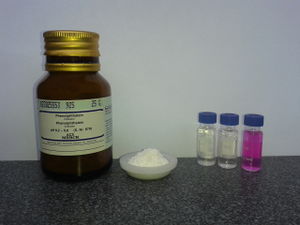Phenolphthalein
 Phenolphthalein sample (center) with original bottle (left) and in solution at acidic and neutral pH (colorless) and basic pH (pink)
| |
| Names | |
|---|---|
| IUPAC name
3,3-bis(4-hydroxyphenyl)isobenzofuran-1(3H)-one
| |
| Systematic IUPAC name
Phenolphthalein | |
| Other names
HIn
phph | |
| Identifiers | |
| Jmol-3D images | Image |
| |
| Properties | |
| C20H14O4 | |
| Molar mass | 318.33 g/mol |
| Appearance | White powder |
| Odor | Odorless |
| Density | 1.3 g/cm3 (at 20 °C) |
| Melting point | 262.5 °C (504.5 °F; 535.6 K)[1] |
| Boiling point | Decomposes |
| 0.04 g/100 ml | |
| Solubility | Very soluble in acetone, ethanol and pyrene Soluble in chloroform, diethyl ether, and toluene Slightly soluble in carbon disulfide Insoluble in benzene, hexane, petroleum ether |
| Vapor pressure | 6.7·10-13 mm Hg at 25 °C |
| Hazards | |
| Safety data sheet | Acros Organics |
| Flash point | Non-flammable |
| Except where otherwise noted, data are given for materials in their standard state (at 25 °C [77 °F], 100 kPa). | |
| Infobox references | |
Phenolphthalein is an organic chemical compound, often used as an indicator in acid–base titrations. For this application, it turns colorless in acidic solutions and pink in basic solutions.
Contents
[hide]Properties
Chemical
Phenolphthalein is colorless at acidic and neutral pH and pink at basic pH.
Physical
Phenolphthalein is a white solid, poorly soluble in water but very soluble in acetone and ethanol.
Availability
Phenolphthalein is sold by various chemical suppliers.
Preparation
Phenolphthalein can be prepared by reacting phenol with phthalic anhydride, in the presence of anhydrous aluminium chloride and zinc chloride. Thionyl chloride can substitute aluminium chloride.
- 2 C6H5OH + C6H4C2O3 → C20H14O4
Projects
- Base indicator
- Ferroxyl indicator solution
- Kastle–Meyer test
Handling
Safety
Phenolphthalein, if taken orally, is mildly toxic, a suspected carcinogen and a powerful laxative. Several decades ago, it was commonly used as such in medicine. Today, less toxic laxatives are used.
Storage
Phenolphthalein should be kept in closed bottles, away from acidic vapors.
Disposal
Can be destroyed with a strong oxidizer, such as Fenton's reagent, chromic acid or piranha solution, neutralized and poured down the drain.
Gallery
References
- Jump up ↑ Lide, D.R., G.W.A. Milne (eds.). Handbook of Data on Organic Compounds. Volume I. 3rd ed. CRC Press, Inc. Boca Raton ,FL. 1994., p. V4 3297
Relevant Sciencemadness threads
- Chemical pages without CAS Registry Number
- Articles without EBI source
- Chemical pages without ChemSpiderID
- Chemical pages without DrugBank identifier
- Articles without KEGG source
- Articles without InChI source
- Articles without UNII source
- Articles containing unverified chemical infoboxes
- Chemical compounds
- Organic compounds
- Aromatic compounds
- Phenols
- PH indicators
- Essential reagents

